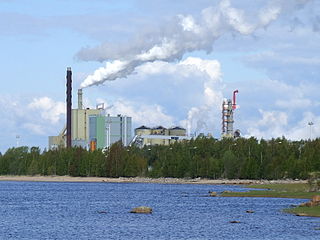
UPM-Kymmene Oyj is a Finnish forest industry company. UPM-Kymmene was formed by the merger of Kymmene Corporation with Repola Oy and its subsidiary United Paper Mills Ltd in 1996. UPM consists of six business areas: UPM Fibres, UPM Energy, UPM Raflatac, UPM Specialty Papers, UPM Communication Papers and UPM Plywood. The Group employs around 17,000 people and it has production plants in 11 countries. UPM shares are listed on the NASDAQ OMX Helsinki stock exchange. UPM is the only paper company which is listed in the global Dow Jones Sustainability Index and also a member of the United Nations Global Compact organization.
Stora Enso Oyj is a Finnish and Swedish forest industry company. It develops and produces various materials, mostly based on wood, for a range of industries and applications worldwide. It has headquarters in Helsinki, Finland, and Stockholm, Sweden. The majority of sales takes place in Europe, but there are also significant operations in Asia and South America. Stora Enso was formed in 1998, when the Swedish mining and forestry products company Stora AB merged with the Finnish forestry products company Enso Oyj. In 2023, there were 20,000 employees. In 2015, Stora Enso was ranked seventh in the world by sales and fourth by earnings, among forest, paper and packaging industry companies. For the first two quarters of 2018, the company was ranked second by net earnings among European forest and paper industry companies. The corporate history can be traced back to the oldest known preserved share certificate in the world, issued in 1288. Based on this, some observers consider Stora Enso to be the oldest limited liability company in the world.
Boise Cascade Company is an American manufacturer of wood products and wholesale distributor of building materials, headquartered in Boise, Idaho.

Svenska Cellulosa Aktiebolaget SCA is a Swedish timber, pulp and paper manufacturer with headquarters in Sundsvall. It has approximately 3,300 employees and a turnover of approximately SEK 20.8 billion. Its main products include many one-use paper products, containerboard, solid-wood products, pulp and forest-based biofuel. SCA is Europe's largest private owner of forest land, with 2.7 million hectares. The global hygiene product company Essity was part of SCA until 2017.

Sappi Limited, originally incorporated as South African Pulp and Paper Industries Limited in 1936, is a South African pulp and paper company with global operations.
The pulp and paper industry in Europe accounts for about a quarter of world production and is a major employer. The leading producing countries are Finland, Sweden and Germany. The industry is a large user of renewable energy and achieved a recycling rate of 71.5% in 2015.
Ahlstrom Oyj is a manufacturer of fiber-based products. Renewable fibers represent about 95% of Ahlstrom's total fiber use.
Göran Albert Casimir "Casse" Ehrnrooth, titled Vuorineuvos, was a Finnish magnate and former chairman of the Nokia Corporation. His business career began in the forest industry, and later he was a director of UPM-Kymmene and Merita-Nordbanken.

A forest product is any material derived from forestry for direct consumption or commercial use, such as lumber, paper, or fodder for livestock. Wood, by far the dominant product of forests, is used for many purposes, such as wood fuel or the finished structural materials used for the construction of buildings, or as a raw material, in the form of wood pulp, that is used in the production of paper. All other non-wood products derived from forest resources, comprising a broad variety of other forest products, are collectively described as non-timber forest products (NTFP). Non-timber forest products are viewed to have fewer negative effects on forest ecosystem when providing income sources for local community.

Renewable energy in Finland increased from 34% of the total final energy consumption (TFEC) in 2011 to 48% by the end of 2021, primarily driven by bioenergy (38%), hydroelectric power (6.1%), and wind energy (3.3%). In 2021, renewables covered 53% of heating and cooling, 39% of electricity generation, and 20% of the transport sector. By 2020, this growth positioned Finland as having the third highest share of renewables in TFEC among International Energy Agency (IEA) member countries.
The Forest Products Association of Canada (FPAC) is a trade association which represents Canada's wood, pulp and paper producers both nationally and internationally in government, trade, and environmental affairs. Canada's forest products industry is an $80 billion a year industry that represents 2% of Canada's GDP.
Kruger Inc. is a Canadian private company which manufactures publication papers, lumber and other wood products, corrugated cartons from recycled fibres, green and renewable energy, and wines and spirits. Kruger Inc. operates facilities in Québec, Ontario, British Columbia, Newfoundland and Labrador, and the United States. KP Tissue, Inc. is a separate, publicly traded holding company, headquartered in Mississauga, Ontario, Canada.

The environmental impact of paper are significant, which has led to changes in industry and behaviour at both business and personal levels. With the use of modern technology such as the printing press and the highly mechanized harvesting of wood, disposable paper became a relatively cheap commodity, which led to a high level of consumption and waste. The rise in global environmental issues such as air and water pollution, climate change, overflowing landfills and clearcutting have all lead to increased government regulations. There is now a trend towards sustainability in the pulp and paper industry as it moves to reduce clear cutting, water use, greenhouse gas emissions, fossil fuel consumption and clean up its influence on local water supplies and air pollution.
Yhtyneet Paperitehtaat Oy was a Finnish forest industry company which was created in 1920 and the paper company formed UPM-Kymmene PLC together with Kymmene in 1996.

Metsä Group is a Finnish forest industry group present in about 30 countries. Metsä Group's core businesses are tissue and cooking papers, board, pulp, wood products as well as wood trade and forestry services. Metsä Group's sales totalled EUR 6.0 billion in 2021, and it employs approximately 9,500 people.

Philippe Joubert, is a French Brazilian business executive.
Jacqueline Anne "Jacque" Hinman P.E. LEED is one of a small number of women who have led Fortune 500 companies. She was most recently the chairman, president and CEO of CH2M. In the first quarter of 2024, she will take over as the CEO of Atlas Technical Consultants, based out of Austin, Texas.

Forest industry in Finland consists of mechanical (timber) and chemical forest industry. Finland is one of the world's largest producer of pulp, paper and cardboard and one of Europe's largest producers of sawn timber. The forest industry directly and indirectly employs approximately 160,000 people in Finland. The industry's multiplier effects extend broadly into surrounding society.
Repola Oy was a Finnish industrial conglomerate, between 1990 and 1995, in the engineering and forest industries.
The International Council of Forest and Paper Associations (ICFPA) is an international interest group and trade association for the pulp and paper industry.








